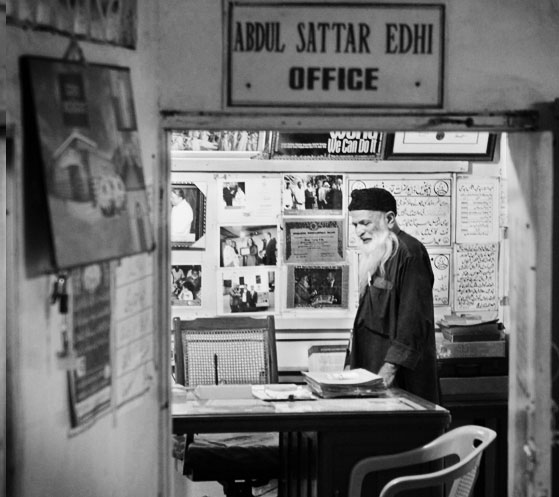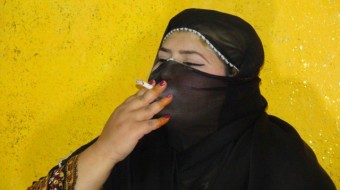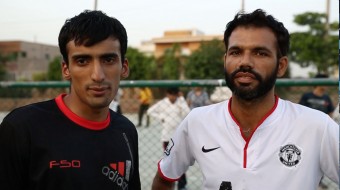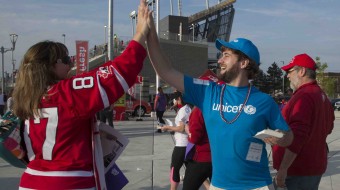Pic: nobelprizeforedhi.com
Video: Guavo Media
In most developed countries of the world there is an expectation that local and national infrastructures are in place providing a set-list of public services to the citizens of its nation. It is to be expected that the duty of government officials is to put in place the necessary processes in which to ensure needs of the mass public are catered for, and then for such services to be held accountable.
So how do such structured public services remain funded and efficiently manage themselves in regions where political instability is also a key factor and populations are dense with a broad scale of economic imbalances?
In this case in Pakistan in South Asia… one man by the name of Abdul Sattar Edhi is the incredible philanthropist and entrepreneur who over sixty years ago took proactive action to implement a self-funded medical emergency service for the nation and its people that it can be proud of and evolving it to become as large as it is today; in fact now one of the worlds largest ambulance and emergency services.
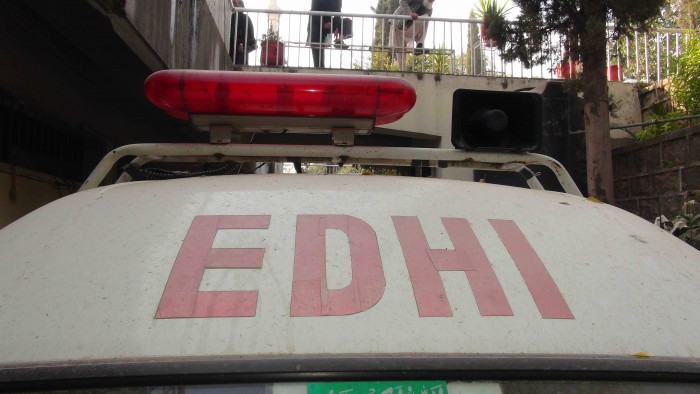
Guavo Media
Abdul Sattar Edhi gave up everything to make it his lifetime mission to devote his life to helping his nation, in particularly motivated to helping the poorest communities living in his country.
Many who have met with Mr Edhi and even for those working for his many public services in place in Pakistan, they all describe him as an almost saintly character, someone who possesses an almost spiritual and moral greatness not commonly found in the average citizen. He is revered by Pakistanis for his service to others and his commitment to humanity that has remained all of his life. And it has been quite the life he has lived that has brought him the kind of reverence he receives now from not only Pakistanis, but from the world over.
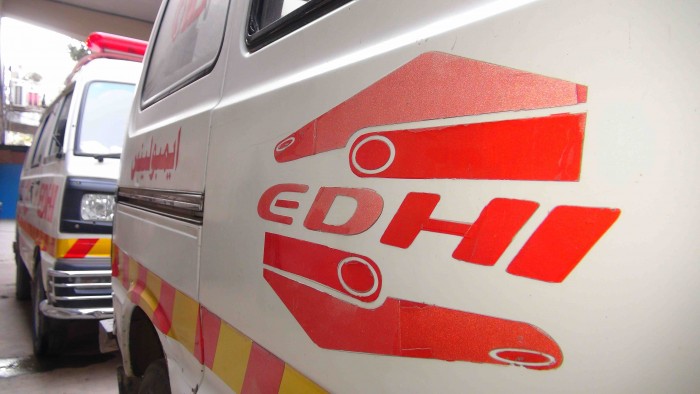
Guavo Media
Mr Edhi had apparently once stood on a street corner in Karachi and begged for money for an ambulance van, eventually raising enough to buy a battered old van. It was in this van that he set out on the first set of life-saving missions.
Gradually, Mr Edhi set up centres all over Pakistan. He diversified into orphanages, homes for the mentally ill, drug rehabilitation centres and hostels for abandoned women. He fed the poor and buried the dead. His compassion was boundless and his proactive spirit to put in place all the gaps in social services he witnessed is truly remarkable, especially considering he had to raise funds himself.

During his early efforts, he confronted his employers at a charity service run by a religious centre, telling them that “humanitarian work loses its significance when you discriminate between the needy” after being disgusted at the fact they only provided services to certain sects of the religious communities.
So he set up a small medical centre of his own, sleeping on the cement bench outside his shop so that even those who came late at night could be served. He was faced with incredible challenges including threats from others to kill him because he decided to independently set up services. For safety, and in search of knowledge, he set out on an overland journey to Europe, begging all the way and living on the streets.
In London, he was a great admirer of the British welfare state, though he noted its potential to encourage a culture of dependency. He is said to have been offered a job but refused, telling his benefactor:
“I have to do something for the people in Pakistan.”
On return from Europe, his destiny was set. There was no welfare state in Fifties Pakistan: he decided he would fill the gap. This was a difficult period in his life. Shabby and with little funds and no obvious prospects he would hurtle round the province of Sindh in his poor man’s ambulance, collecting dead bodies, taking them to the police station, waiting for the death certificate and, if the bodies were not claimed, burying them himself.
The more people you speak to about Abdul Sattar Edhi, especially those based in Pakistan, and reading about him through the writings of journalists and social commentators around the world it becomes apparent that he truly is a remarkable human being. A social activist, a philanthropist, a visionary… and at his core throughout his lifetime, a humanitarian dedicated to serving others.

IM
Edhi has remained a simple and humble man always. To this day, he owns just a few pairs of clothes, has never taken a salary from his organisation and lives in a small two bedroom apartment over his clinic in Karachi. He has been recommended for a Nobel Peace prize on many occasions and yet still has not officially been recognised… to the extent where there are many individuals pushing for this accolade to be given.
His health is currently not at its best and alongside his wife, family and friends and a vast number of future Edhi followers who have chosen to adopt his philosophy to serve others; the Edhi Foundation today is thriving and continues to fulfil its purpose during climates where the need for the emergency services are far more important than ever.
We wished to be able to interview Mr Edhi, but due to his health issues it was not possible and so we decided to provide a small glimpse into one of the ambulance services in Islamabad, Pakistan. We have been deeply impressed having interacted with the team running this service which is just one of so many around Pakistan… and even more impressive was the impact one man seems to have made on the psyche of so many of the workers and those they serve.
Imran Yousef who is one of the ambulance drivers we interacted with is a great example of someone influenced by the philosophy of Mr Edhi and he, alongside his colleagues are committed to follow in the steps of their mentor, and their hero.
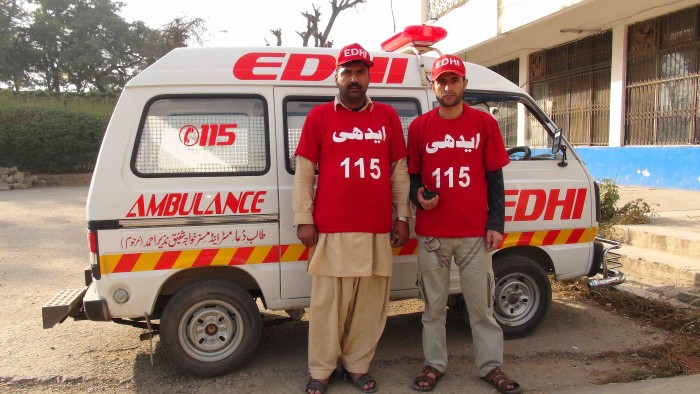
Guavo Media
Today the Edhi Foundation continues to provide an excellent level of service during difficult yet transitioning times in Pakistan. It is clear that he is leaving the kind of legacy for social care that the likes of Jinnah, the nations first leader would have himself even envisioned and been proud of. It is said that Edhi himself does not consider the actions he has taken in his life, and the impact his legacy has left as anything special. He simply considers it a human duty that he has remained committed to. Something we feel certainly demands more global focus, and in my humble opinion his story is one that should be heard by all.
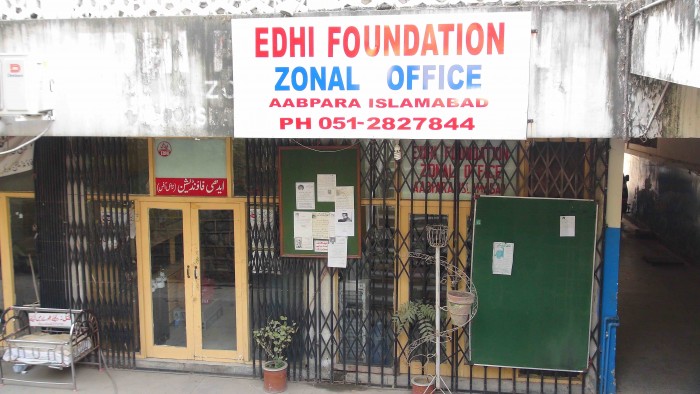
Guavo Media
When asked by a western Journalist not too long ago about what Mr Edhi saw for the future of Pakistan… amidst the instability, imbalances and deep issues of corruption amongst those in power he responded:
“Unless things change… I predict a revolution.” he said.
Maybe he is spiritually on a higher plane than the rest of us mere mortals… because the revolution he once predicted seems to have started in 2014. We wish the people of the nation a positive 2015 especially following recent instability in late 2014 and we also wish Mr Edhi good health in the coming year and hope others respond to his needs during his recovery in the same manner he has responded to the needs of others all of his life.
Mr Edhi was said to have been incredibly proud this year when Malala Yousafzai was awarded this years’ Nobel Peace Prize, during which he himself was also considered for the award. He told Reuters agency:
“Malala is a Pakistani who has made us proud. She is also a well-educated girl advocating positive. I am very happy that she has won this award. It is a very good thing.”

Nobel
An interesting website also advocating for a nobel prize recognition for Mr Edhi and his lifetime of work for others, something any have petitioned for many years:
www.nobelprizeforedhi.com/the-petition.php
For more about all of the work of the Edhi Foundation visit: www.edhi.org
And to view the full batch of photos from our filming with the ambulance service in Islamabad
EDITORIAL NOTE: In October this year, Mr Edhi’s home in Karachi was raided by robbers who took away much of his possessions from his home. Click Here for the ARTICLE VIA GUARDIAN NEWSPAPER.
